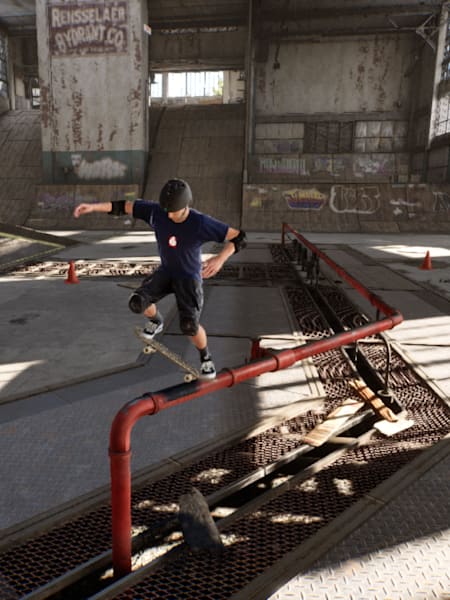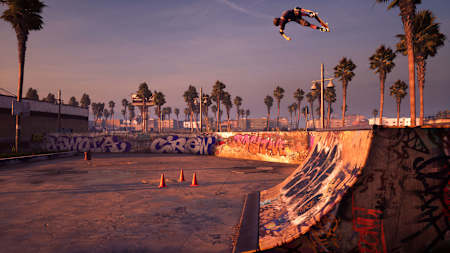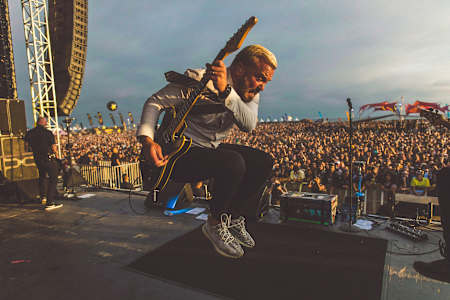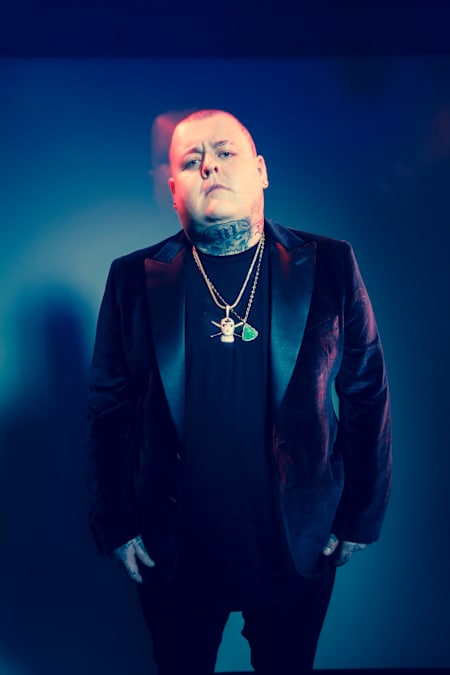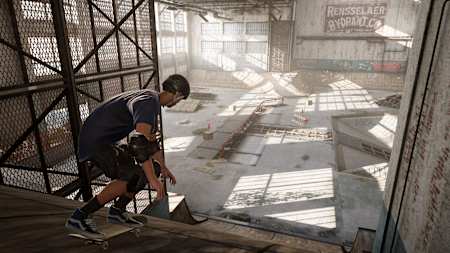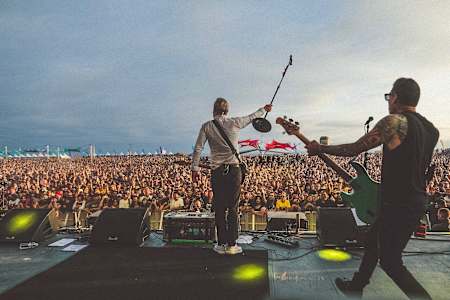Skateboarding
Picture the year 1999: society prepares to shift into a new millennium as Y2K fever and the end of the nineties sweep through a nation and its adolescents. Adolescents accustomed to tuning the radio to the sounds of Shaggy’s “It Wasn’t Me” and Smash Mouth’s “All Star.” Tony Hawk’s infamous 900 leads the summer headlines as both the mainstream and hermetic cultures of skateboarding are kneepad deep in a golden age.
Just three months after the 900, Activision and Neversoft developers released their magnum opus upon an entire generation by introducing the world to Tony Hawk’s Pro Skater (THPS) and its punk rock soundtrack. The following year, the franchise would release its second installment THPS2, with added hip hop and punk music for a hugely successful sequel to its opening installment. While no one might have realized it at the time, these two games changed skateboarding, music and video games forever.
Regardless of how old we were when we first played THPS, when “Superman” by Goldfinger reaches our ears, we’re instantly back at home pushing start to the warehouse skatepark. We can practically feel the controller in our hands, readying ourselves to shatter through the glass and blast down the roll-in to the ginormous halfpipe gap below. It was after our homework, gathered around the now-extinct, square, bulbous television, we watched in awe as the door to skateboarding was opened before our eyes. We took our first steps into a greater world, a world made complete with a soundtrack capturing the true ethos of skateboarding.
We were personally invited by Activision and Tony Hawk into the spaces of professional skateboarders, to wear their '90s fashion and learn of the top pros and their catalog of tricks. As we played in awe at the unveiling of the world of skateboarding, it was the music that made it understandable; undeniable. It was from this understanding, we were empowered to embark on our own journeys into the musical forces that would go on to shape our lives and the careers of those artists included. Now, after twenty-plus years, THPS maintains an enduring bond between punk, hip hop, and skateboarding that no one at the time knew a video game could create.
In these unprecedented times, we sat down virtually to interview some of the original artists including in the 1999 THPS, on how the infamous soundtrack had a profound impact not only on their careers but fans for years to come. We’ll also have the chance to hear from some of the new artists included in the upcoming reinstall, on what it means to be the next songs in the queue of the Tony Hawk’s Pro Skater legacy. With the help of Activision, as the cherry on top and without releasing too many spoilers, we’ve also listed some of the artists included in Activision's THPS1+2 scheduled for release on September 4th, 2020.
There’s so much more that goes into a game than most people will ever realize – just how there’s a lot more that goes into a song for musicians. The soundtrack for the game had a cost of about $30,000, remarkable in its own feat, considering you could maybe license one song for that price in 2020. Tony Hawk and Activision began simply but profoundly with a dedication to accurately represent the skateboarding culture of the times.
“I never thought of it in lofty terms of what it could be,” said Hawk in an interview with Loudwire. “I wanted the game to represent skateboarding well – to be authentic. That was all we focused on because I wanted skaters to be proud of it. I wanted to include punk music; a soundtrack to skating that I grew up with.”
In the echo of Hawk’s words, the developers were not looking for cues from other games, but rather, were looking at skate culture for inspiration. It was much more than just including rad music in the games, it was about somehow encapsulating the spirit of skateboarding into a playable, fully immersive video game for all to enjoy. While the soundtracks of the THPS 1 and 2 had a profound effect that persists to this day on its players, the artists involved received an equally profound effect on their careers.
“We were on tour in England in this 2000 seater,” frontman John Feldmann of Goldfinger, told us. “The crowd was pretty cool, but they weren't really all the way into it. Superman was the third song on our set and when we played that song people just went crazy. I’m talking full mosh-pits, people stage diving, the whole crowd was going insane. I was wondering at that moment, like why that song? Our second album had just come out, maybe a week prior to the tour and Superman was the second song on that album: so, I knew it hadn’t been out long enough for people to really obsess over it like that. Then afterwards we were signing posters and merchandise for fans outside and everyone kept saying, “Dude, Tony Hawk. Tony Hawk’s Pro Skater!”
In a music industry that’s evolved into a “what have you done for me lately” mentality, these songs stand immortalized in ways that concert tickets and even literal album sales cannot convey. Every major streaming platform has a “Tony Hawk’s Pro Skater playlist,” and to this day, countless fans of the game express how THPS helped them discover musicians they still love and listen to in 2020.
“At the time this was unprecedented,” said Feldmann. “There wasn’t a real video game music hybrid that existed that promoted bands. This was the first vehicle for us to use as a promotional tool and we had no idea really how to. [laughs] We just knew Tony Hawk was a legend, and of course, let's be a part of a video game. I had no clue it was going to lead to something like this.”
For decades following the release of the THPS franchise, sports games have endeavored to recreate what THPS did for their respected sport. As the soundtrack precedent for video games, every major franchise from Madden NFL, NBA 2k, to Need For Speed have swapped the in-house scores of PacMan beeps and bops for licensed music.
Activision and Neversoft did so prophetically by including a mix of both classic and contemporary punk with original and new age hip hop. THPS’s first installment featured pioneering punk from the Dead Kennedys with Police Truck and more contemporary punk songs from their disciples: The Suicide Machines "New Girl" and "Committed" by The Unsane. While players listened to the bold THPS1 soundtrack of classic punk from the Dead Kennedys and the Vandals, these bands which formed in the late '70s and early '80s watched their music spread to new listeners.
The second installment carried on the punk legacy with tracks like "You" from Bad Religion, and "Blood Brothers" by Papa Roach, but also added supreme hip hop tracks like "Subculture" by Styles of Beyond and Dub Pistols’ "Cyclone." Young players listened to Anthrax and Chuck D’s "Bring the Noise" and Rage Against the Machine’s "Guerrilla Radio," as the backdrop to High Score challenges, collecting the S.K.A.T.E. letters and finding the allusive Secret Tapes. With nothing more than a few buttons, players were shredding through empty malls, Philadelphia plazas, southern California school yards and underground skateparks while indulging in a pure shot of musical adrenaline.
“The soundtracks on those games basically molded my childhood and the same goes for people who I know played those games,” Merkules, one of the new hip hop artists in the new installment, told us. “I can only hope that now, when kids hear my music that it can only do the same for them. I think everything the soundtrack accomplishes directly represents the [skateboarding] culture and what it’s supposed to represent. Not only does it give me the coolest bragging rights in the world, it's all about how proud I am to be a part of this legacy.”
It is from this crossroads of punk music, hip hop music, skateboarding and video games we arrive at the cultural orchestra of the THPS franchise. Now, as we prepare for the new installment of Tony Hawk’s Pro Skater 1 and 2 under one game, we bear witness to more than just a service of nostalgia and past glory but a reincarnation of those musical forces that shaped our lives.
“It’s so rad to think about how Rage Against the Machine was included in THPS. I literally discovered them through the game and I still love and listen to them to this day. Styles of Beyond really sticks out to me too. I just remember that voice. When I hear that opening voice, I just think Tony Hawk’s Pro Skater.”
The musical impact of THPS1+2 shaped the trajectory of what skateboarders would grow up to listen to and the careers of every band included in the games. That is precisely why the new THPS1+2 installment features a mix of old and contemporary songs from the genres of punk and hip hop as an homage to the original game music that shaped the franchise at its roots. Activision’s THPS1+2 reinstallment features original '80s hip hop from such groups like A Tribe Called Quest peppered alongside contemporary rappers like Merkules and Machine Gun Kelly. An homage to he original punk music and ska bands from later installments, players will once again be pushing start to shred the streets with Destroy Boys, Zebrahead, and Sublime as their soundtrack. With the reinstall right around the corner, those of us fortunate enough to have played the originals or been included in the first Tony Hawk Pro Skater soundtrack, have a unique chance to reflect on a musical legacy spanning two decades.
“Watching the music business change, from records, to CD’s, to mp3, to Napster, to streaming - we’ve gone through all these cycles and the same with video games,” Feldmann reflected to us. “To think about much that has changed and to know that this video game has stayed pure in its intent and there's a real nostalgia with it, while somehow remaining relevant and to watch how people are still chiming in. The chatter around the remaster, it’s just incredible. It stands the test of time through the evolution of technology. The fact we are still talking about it is a testament to how great the game really was. I’m just thankful to be a part of that legacy.”
In a time before smartphones and YouTube, for many of us Tony Hawk’s Pro Skater was our first introduction to skateboarding. With the catalog of tricks at our fingertips, it’s where we first learned of the kickflip and the smith grind and the rails and gaps presented by the game’s urban environments and grainy skateparks. We now revel in the '90s skateboarding fashion of cargo pants, hoodies and colorful long sleeves represented in the game as people saw Chad Muska sporting a backwards cap and a boom box instead of the helmets and pads the average person saw skaters wearing on television. More importantly, we learned skateboarding takes place in a far greater world than X-Games halfpipes. However, even with players being exposed to these defining elements of skateboarding, we needed the music to make it all make sense. To make it understandable, undeniable. To know, this is skateboarding. The reason the music of the soundtrack is so heavily ingrained in our memories of the game is because it’s what tied it all together. It’s what made it come alive and live in infamy over twenty years later, as we unanimously commemorate the first soundtrack to skateboarding and everything it gave us.

